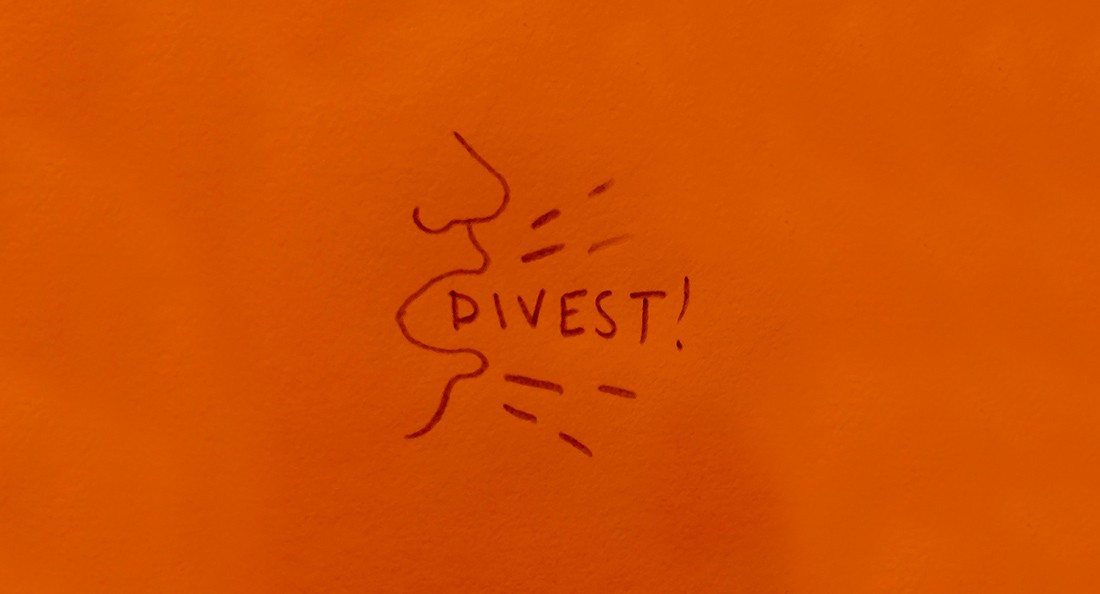Necessary noise
Divest UWinnipeg protest a punctuation point on a broader movement
“People gonna rise like the water, gotta slow this crisis down, hear the voice of my great granddaughter singing climate justice now!”
The chants rang out as over a hundred protesters crammed into a hallway at the University of Winnipeg (U of W) on Monday, Jan. 30.
They were outside of the university’s board of regents meeting, where Divest UWinnipeg members Sadie-Phoenix Lavoie and Kevin Settee presented reasons why the university should withdraw investments from the oil and gas industry.
This student group has rallied for divestment over the past two years. According to an info sheet published on the Divest UWinnipeg Facebook page, they argue divestment is not only economically viable but a moral imperative for a university that claims to be a Canadian frontrunner in sustainability and Indigenous rights.
Divest UWinnipeg’s disruptive protests are necessary tools to counter power imbalances between students and administrations and their powerful donors, but these tools can be either effective or ineffective depending on goals and strategy.
While Divest UWinnipeg’s noisy actions may be the most visible of their activities on campus, it’s important to recognize that these actions serve as punctuation points within their larger campaign.
Divest has already worked through more “respectable” channels, including a year-long consultation process with administration. That process, as reported by CBC News last June, resulted in the university proposing a new policy for ethical and responsible investment and a “fossil-free fund” that would allow donors to invest in green innovation.
Divest UWinnipeg, while acknowledging these proposals as “commendable” in their info sheet, still points out administration has sidestepped the issue of divestment.
The task of divestment, the group states in their info sheet, is foiled by the powerful sway of university donors connected to the oil and gas industry. Most notably, James A. Richardson – one of the sons in James Richardson & Sons, Limited, a company with a net worth of over $5 billion – who sits on boards for both the University of Winnipeg Foundation and Tundra Oil & Gas.
For a student group that wishes to offer a counter-perspective on the actions of one of the wealthiest families in Canada, a creative approach is simply a necessity. In this context, direct action can function as a media arm to get the message out.
Behind the protest was a significant amount of unseen labour spent on research, education, correspondence, outreach and networking. Not only were Lavoie and Settee inside the meeting, but Wayne Wachell from Genus Capital flew in from Vancouver to bring the financial feasibility of divestment to the table.
The strength of direct action is how it provides a forum for a wide variety of people to participate in an issue they care about, and form a broad base of support.
Faculty members who organized a divestment teach-in weeks prior were also present in the hallway, in addition to Wolseley MLA Rob Altemeyer, who was chanting alongside students.
The board of regents will reconvene in March, when they may revisit divesting from fossil fuels. Unfortunately, it is entirely possible that the fervent and creative Divest UWinnipeg campaign will meet another brick wall of suits voting “no.”
Those quick to dismiss the disruptiveness of direct action only need to look a little closer at the unequal power dynamics to understand this kind of organizing as a valuable and necessary tactic.
Emily Leedham is a Winnipegger who is fond of her home, the Earth, and wants to keep it around.
Published in Volume 71, Number 20 of The Uniter (February 16, 2017)








